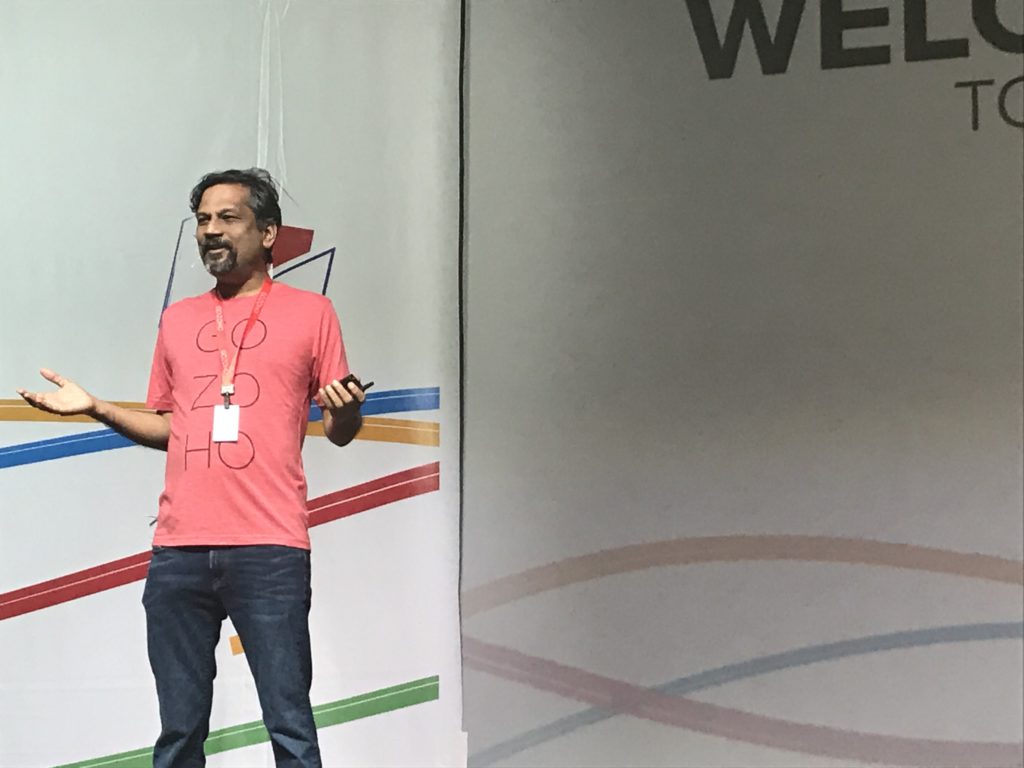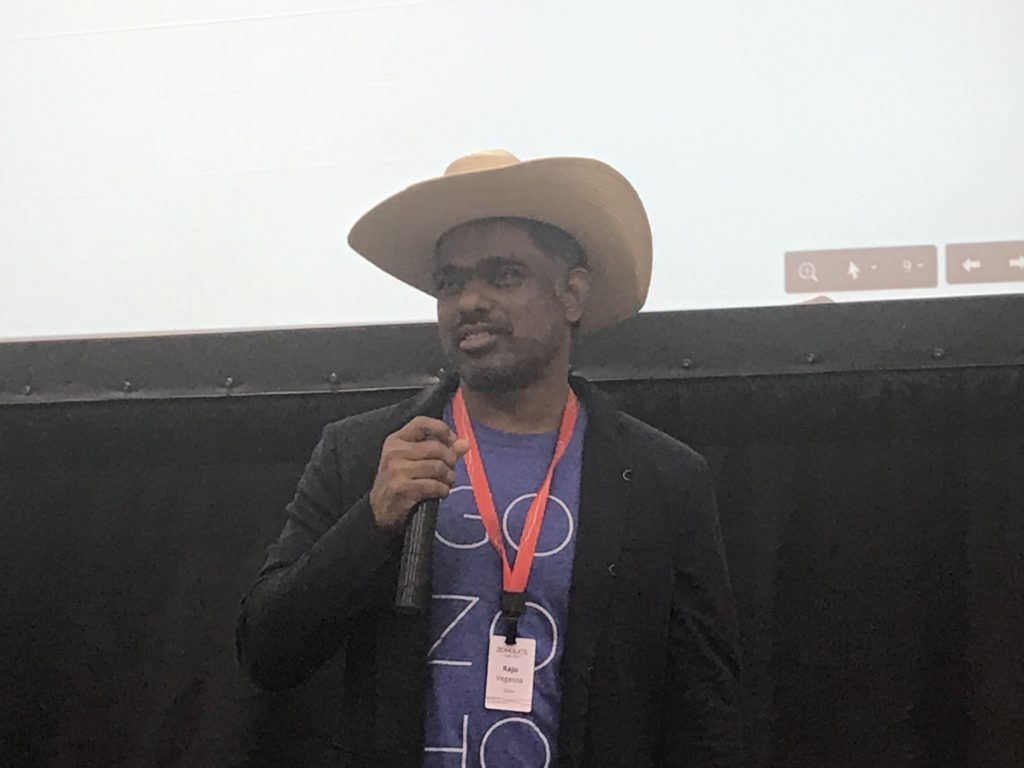By LAURA LOREK, Publisher of Silicon Hills News

Sridhar Vembu, Zoho’s founder and CEO at its Zoholics conference in Austin
Zoho wants to keep things weird in Austin.
The software company officially announced this week at its annual Zoholics conference that it is moving its headquarters from Pleasanton, Calif. to a 369-acre campus near the Austin airport.
“I like Austin,” said Sridhar Vembu, Zoho’s founder and CEO, when asked during a press conference Wednesday afternoon at Zoholics about the move.
“My only thing is, I hope that not too many people are like us and select Austin because we don’t want to lose it,” Vembu said. “Actually, I was talking to someone today: Austin is how San Francisco used to be 30 years ago. It had the weirdness. It had all this stuff. The artists and the live music.”
On his way back to his hotel Wednesday night, Vembu came across a band playing and had to stop and listen to the music.
“It’s unbelievable,” he said. “I thought man, this is heaven.”
But if too many people move here, they are going to screw it up, like they screwed up San Francisco, Vembu said. That echoes a sentiment many in Austin feel with the dramatic expansion of the technology industry in the past decade.
In addition to Zoho’s new campus, Amazon is expanding its presence with a new building and 800 more employees in the Domain, and Apple is putting in a $1 billion campus in North Austin. And Oracle’s Larry Ellison said its new downtown campus, which opened last year with 2,000 employees will expand to 10,000 employees in coming years.
But Zoho isn’t the typical technology company. And Vembu, sporting jeans, a red Go Zoho T-shirt, and sandals, is not a typical tech founder. He’s a laidback entrepreneur who thinks differently about business and he focuses on long-term accomplishments instead of short-term results.
For example, Zoho, founded 23 years ago, is bootstrapped and has never taken on any outside investment. And its approach to doing business is decidedly different than most in Silicon Valley.
“To do interesting things you cannot have outside investors that have a different mindset,” Vembu said.

In addition, Zoho doesn’t do merger and acquisitions to expand its product line but instead develops all of its own software. It has 7,000 employees today with many of them based at a 45-acre campus in Chennai, India. Zoho makes a suite of software applications to run a business. It calls its Zoho One product “an operating system for business.”
And here’s a fascinating tidbit – Zoho’s campus on the outskirts of Austin off Texas State Highway 71 near Kellam Road – cost less to buy than Zoho’s 45-acre campus in India, said Raju Vegesna, Chief Evangelist at Zoho.

Raju Vegesna, Chief Evangelist at Zoho.
Vegesna heads up Zoho’s Austin operations. The company has been in Austin for about 10 years. It currently leases 27,000 square feet of space in the Bergstrom Tech Center, next to where Opcity has its headquarters. It has 60 employees currently but expects to reach 100 by the end of the year, Vegesna said. He moved to Austin two years and he bought the first 90-acre plot, under the name T&V Holdings, a year ago and recently Zoho bought an adjacent 279-acre tract. The two plots of land are valued at $4.7 million by the Travis County Property District. But Zoho did not disclose what price it paid.
And here’s another thing that sets Zoho apart: Zoho is not going to seek incentives from local or state government or ask for tax abatements on the property, Vegesna said. It might ask the City of Austin for help in dealing with getting permits to set up wastewater and water to the site, Vegesna said.
“It’s currently farmland,” he said. “We have cows on the site.”
The land is listed as dry cropland and native pasture on the property roll.
Plans call for Zoho to build a 100,000 square foot building on the campus, which should be complete in 2021, Vegesna said. That building will house about 500 employees, he said. Zoho plans to hire most of those workers locally and plans to keep its Pleasanton office, he said. He doesn’t expect many workers to relocate from California.
Zoho also hopes to open its first Zoho University in the United States at the site. It has a Zoho University in India. At the school, Zoho pays students to learn how to create and use Zoho software. It hires many of its graduates. About 15 percent of Zoho’s engineering workforce is made up of graduates from Zoho University. It’s hoping to have a similar program in Austin, Vegesna said.
“We create our own talent,” Vembu said.
At the Zoholics event, Zoho invited 50 high school students from the Del Valle Independent School District, which is where its campus will be located, to participate in the program. It hopes to work closely with Austin schools, Austin Community College and others in the local education system, Vegesna said.
The Zoholics event at the Palmer Events Center was the largest user conference to date with more than 1,600 people attending, including 200 Zoho employees.
During his keynote talk, Vembu, CEO of Zoho, told the audience that Zoho has a “particular kind of vision” that’s “insanely ambitious.”
“You almost have to be crazy,” Vembu said.
Zoho has a unique culture that focuses on holistic thinking, Vembu said.
“The entire Zoho products suite came from that kind of thinking,” Vembu said.
Zoho has built a culture and strategy with vision, drive and patience, he said.
“We have achieved all of this while keeping the human element at the center,” Vembu said.
Zoho has created 48 software apps for sales and marketing, finance, email and collaboration and more. It put them altogether and offers them to business as Zoho One. The company has seen an explosion in interest from customers in the last few years, Vembu said.
Zoho is succeeding because it has relentless determination to make its software work together and to keep going, Vembu said. It also has patience in execution, he said.
“The patience and boldness especially in today’s world is really, really hard,” he said.
That’s why Vembu seeks solitude. He doesn’t carry a phone with him. He likes to get an hour or two of solitude a day to contemplate, think and create.
Zoho has had a 15-year research and development period. It started its office suite in the fall of 2003, Vembu said.
“It took us 10 years to get to the level where we thought it was something good,” Vembu said.
Being a privately-held company allowed Zoho to take its time to develop Zoho One, a suite of software apps for every kind of business from small to medium to Fortune 500 companies. Its largest customer is a publicly-traded company with 28,000 employees. About 25 percent of Fortune 500 companies are Zoho customers.
Zoho doesn’t have a rush to the “exit,” mentality and that has given the company the ability to do things differently than other tech companies, Vembu said.
“We are not going anywhere,” he said. “There is no exit. Startups now are supposed to aim toward the exit. We said no to that.”
“You do something because you love it,” Vembu said. “Why would we exit what we love?”
Zoho still supports customers, like IBM, which it signed up in 1999.
When competitors melted away during the dot com bust, Zoho was still standing, Vembu said.
“We will survive the present bubble too,” he said. “We believe there is a bubble right now. Tech bubble. Housing bubble. All bubbles always bust. You need to build durable companies that can navigate these huge cycles…We have built this company to survive these bubbles.”
Freedom from Wall Street is what has allowed Zoho to afford its unique culture, Vembu said.
“We don’t have worry about making particular numbers,” he said.
Zoho believes in cultivating long-term customer relationships and long-term employee relationships, Vembu said.
“We take care of employees. I actually never want to lose them,” Vembu said.
It also doesn’t outsource its customer support. It wants its support people to build careers with Zoho, Vembu said.

Raju Vegesna, Chief Evangelist at Zoho.
Zoho’s compound annual gross revenue grew 37 percent the last five years, said Vijay Sundaram, Chief Strategy Officer of Zoho. The company worries that it might be growing too fast, he said.
The U.S. market makes up 42 percent of Zoho’s revenue, down from 52 percent in 2012, Sundaram said.
But it has big plans for Austin, Sundaram said.
“We are going big in Austin that’s the only way to do it in Texas,” he said. “It’s mind boggling to think you can buy that can of land in a major city only 15 minutes from the airport.”
